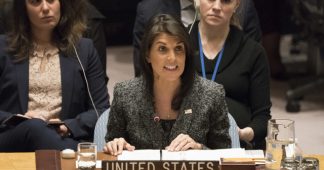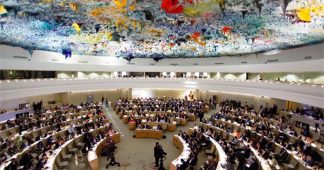By Lasanda Kurukulasuriya
The US quit the UN Human Rights Council on Tuesday (19th June) with rhetoric intended to assert the moral high-ground, slamming the council and selectively ‘naming and shaming’ council members outside its charmed circle of ‘friends.’ While the statements of US ambassador to the UN Nikki Haley and Secretary of State Mike Pompeoin Washington reeked of imperial arrogance, the irony of this grandstanding by one of the worst human rights offenders on the planet would not have been lost on many in the global South, who have been at the receiving end of its worst depredations over time.
Haley accused the council of being “a protector of human rights abusers and a cesspool of political bias.” The US’s own glaring lack of even-handedness in branding its detractors as ‘rights abusers’ while at the same time propping up its strategic allies militarily and economically, no matter how authoritarian or oppressive their conduct, may have escaped Haley. But not those in the majority world who have been forcibly ‘democratised’ by the US at the cost of their dignity and sovereignty, or have become targets of colonization one way or another,through US efforts to maintain global hegemony in the course of history.Even as the US envoy preached human rights, accusing others of ‘hypocrisy,’ herown government was implementing a harsh new immigrant policy of separating children from parents at the US border with Mexico, causing outrage within the US’s ownrights community among others.
The US exit from the HRC in the last analysis was spurred by rancour over its inability to persuade the council to change course over Israel – the US’s Middle East ally – and its treatment of Palestinians. For months,Palestinian protestors in Gaza at the border fence with Israe lhave been facing tear-gas and live fire from Israeli forces,who are reported to have killed at least 125 since the mass demonstrations began in support of their ‘right of return.’ The Human Rights Council last month voted to probe the killings, accusing Israel of using excessive force. Given the background, the superpower’s bid to exit the HRC in the garb of a ‘human rights leader’ comes across more like a modern-day tale of ‘The emperor’s new clothes.’
The US’s withdrawal from the HRC has been a matter of special interest in Sri Lanka, where the yahapalana government has been struggling to comply with the demands of a US-led Human Rights Council resolution, which it misguidedly co-sponsored in 2015. The resolution alleged human rights abuses by Sri Lankan forces during the war against the LTTE and sought reforms,for the purpose of what it called ‘reconciliation and accountability.’Not surprisingly many of these moves,to introduce new laws, institutional reforms,a new constitution that could weaken the central government and seen to encroach on sovereignty -have met with a groundswell of opposition – not least because they are seen by many to be dictated from Washington.
In the wake of the US’s exit from the HRC, some have speculated that pressure to fulfil commitments made in the resolution will somehow be eased. This optimism would seem to be misplaced,if only because the resolution was never about human rights in the first place. It is no secret that the US interest in Sri Lanka derives from the island’s location in the Indian Ocean, near strategically important sea-lanes. It is also well known that the US aims to counter China’s growing maritime footprint, and therefore seeks to dislodge China from the privileged position it is currently seen to enjoy in its relations with Sri Lanka. The US Pacific Command was recently re-named the Indo-Pacific Command, to signal the shift in focus. The US needs to have a ‘hold’ on Sri Lanka in order to make it a compliant partner in its strategic project, and this is where the resolution comes in useful.
It was precisely to ensure that the Government of Sri Lanka does not get the mistaken idea that the US will back off, that the US embassy in Colombo on 21st June issued a statement about the decision to quit the HRC, saying that ambassador Keshap met ‘senior Sri Lankan officials’ to convey“the assurance of the United States Government” that it will “remain fully engaged with the Sri Lankan Government to help it meet its continuing and standing commitments to the international community to advance the cause of reconciliation and lasting peace for all Sri Lankans.”
There were other indications too, that the US has no intention of letting Sri Lanka drop off the radar.In Washington on 20thJune a US House Subcommittee on Foreign Affairs held a hearing titled ‘Human Rights Concerns in Sri Lanka.’ Testifying at the event were J S Tissainayagam, journalist and human rights advocate;Michael Jerryson, PhD, Associate Professor of Religious Studies at Youngstown State University; David M Crane, Principal at Justice Consultancy International, LLC; and John Sifton, Asia Advocacy Director at Human Rights Watch.Fresh avenues of information-gathering are being sought, it would seem.
The opening comments of Congressman Chris Smith,chair of the House Foreign Affairs Subcommittee on Africa, Global Health, Global Human Rights, and International Organizations, betrayed a lack of familiarity with the background to the Sri Lankan conflict, and a barely superficial understanding of the issues. According to excerpts posted on his website, he began by describing the war waged against the LTTE, a banned terrorist organization, as “a brutal ethnic conflict between the majority Sinhalese and minority Tamils.” Other remarks were equally revealing. In a dead give-away of the real motivation behind the US interest in Sri Lanka,he said:
“Sri Lanka’s stability is of critical importance to the United States national interests. Strategically located in the sea-lanes linking the Persian Gulf to East Asia, this island-nation has seen a spike in recent activity by the Chinese. China’s strategy globally is one of indebting countries and binding them in servitude so it can extract resources, so it is safe to say that Beijing’s initiatives will not emphasize ethnic reconciliation and/or human rights. This presents the United States with an opportunity to stand up for justice and the rule of law and to oppose China’s malign influence.”
It is intriguing how Smith’s statement, which starts by referring to ‘the United States national interests,’ morphs into an assertion of concern for ‘justice and the rule of law in Sri Lanka’ which, somewhere along the way, becomes equated with the task of ‘opposing China’s malign influence.’But for the US there is no dislocation here. The US rhetoric comes from the paradigm of ‘the white man’s burden.’It is telling, in this regard, that Pompeo in his remarks in Washington began by saying that Human Rights were God-given, and the Trump administration was committed to protecting them.
There is nothing to suggest that the US has given up its strategic objectives in Sri Lanka as an outcome of leaving the UN rights body. Only its methods of trying to achieve them may change.











